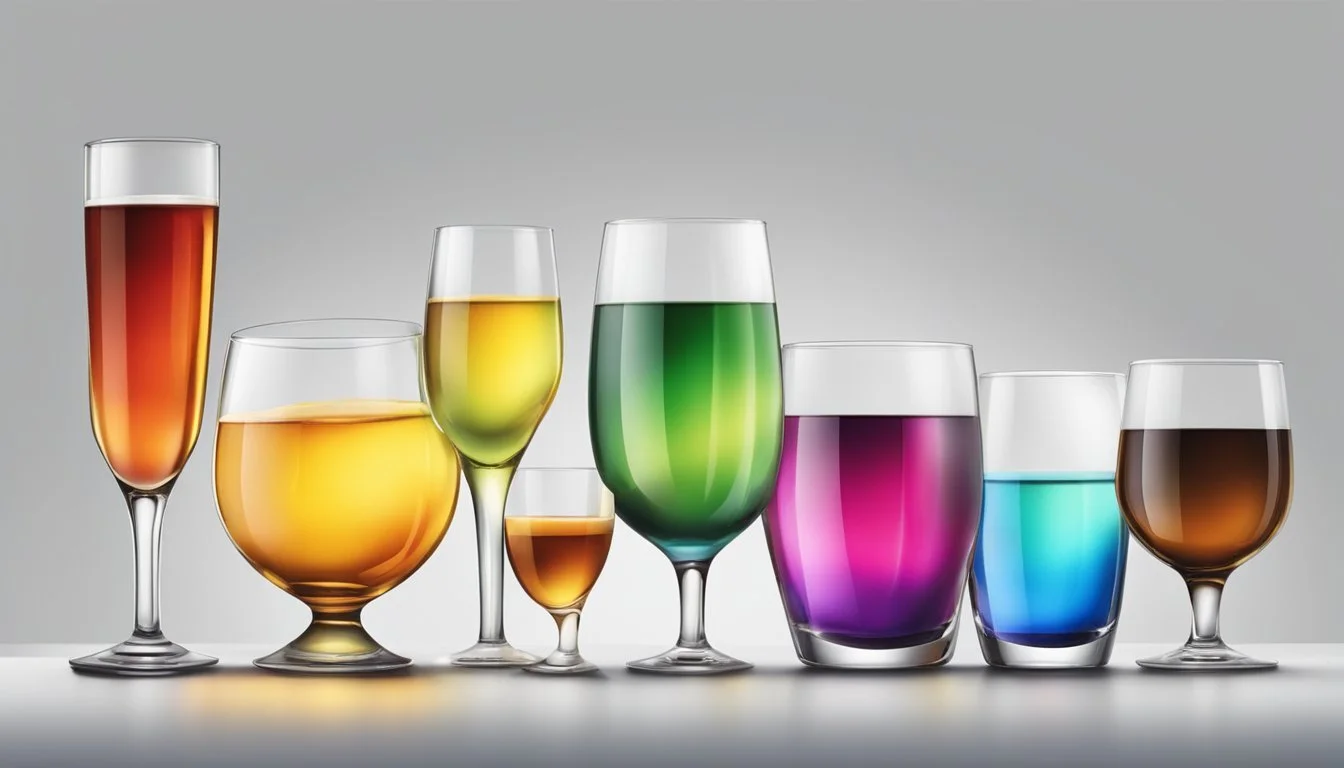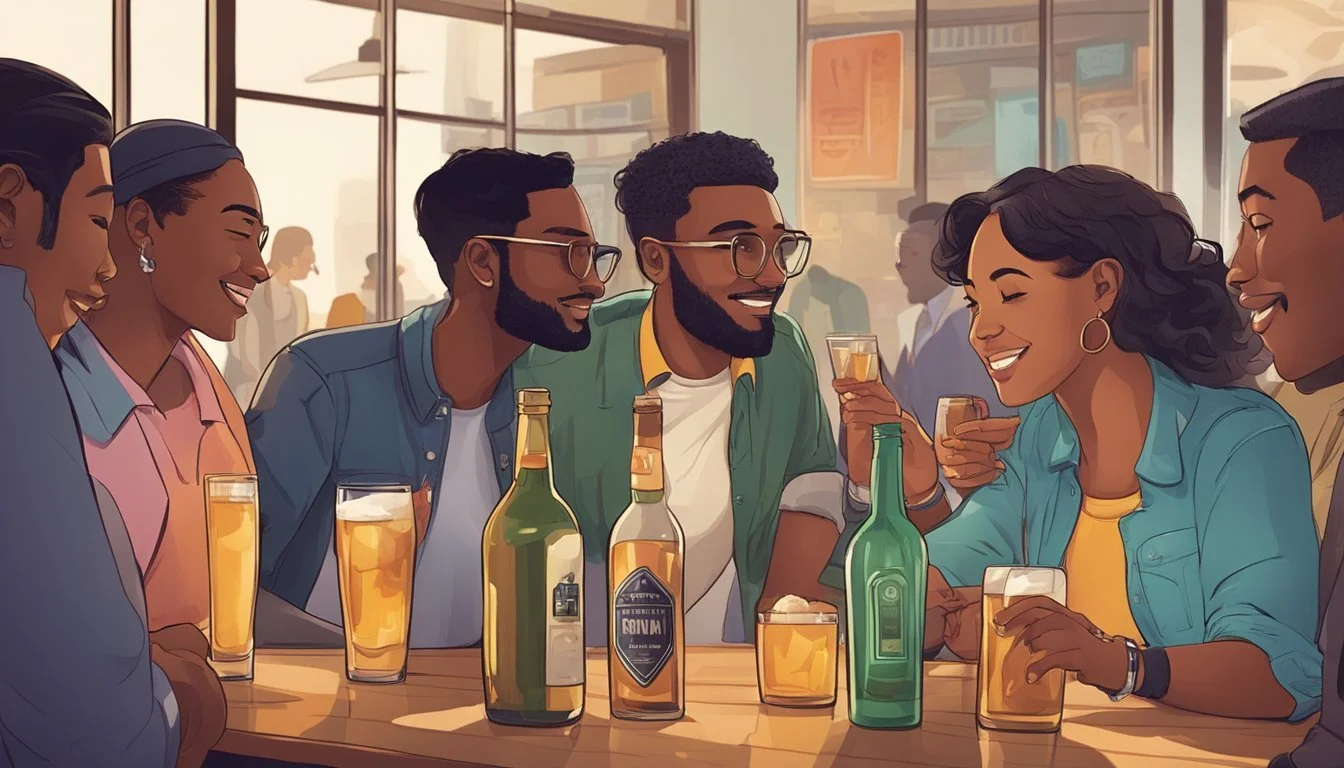Unmasking Alcohol Personality Types: How Drinking Shapes Our Behavior
Alcohol affects people differently, leading to distinct personality changes when intoxicated. Research has identified several common "drunk personalities" that emerge as blood alcohol levels rise. These alcohol-induced personality shifts stem from alcohol's rapid effects on the brain, which can begin within minutes of consumption.
While there's no single "alcoholic personality," certain traits tend to be more prevalent among those struggling with alcohol use disorder. Some individuals become more extroverted and sociable when drinking, while others may turn aggressive or melancholic. The way alcohol impacts a person's demeanor can vary based on factors like mood, environment, and underlying personality characteristics.
Understanding these alcohol personality types can provide insights into drinking behaviors and potential risks. It's important to note that frequent personality changes due to alcohol may indicate problematic use. Recognizing one's own "drunk personality" can be a valuable step in developing healthier relationships with alcohol and making informed choices about consumption.
Understanding Alcohol and Personality
Alcohol consumption can significantly impact personality and behavior. The relationship between alcohol and personality is complex, involving both short-term effects and potential long-term changes.
The Psychology of Alcohol Effects
Alcohol affects brain chemistry, altering neurotransmitter activity and impacting cognitive functions. This leads to changes in mood, judgment, and behavior. As blood alcohol levels rise, inhibitions decrease and impulsivity increases. Decision-making abilities become impaired, often resulting in risky behaviors.
Alcohol's effects on personality can vary based on individual factors and drinking patterns. Some people become more outgoing and sociable, while others may become aggressive or emotional. The "drunk personality" often amplifies existing traits rather than creating entirely new ones.
Personality Traits Influencing Drinking Patterns
Certain personality traits are associated with higher risks of problematic alcohol use. Impulsivity and sensation-seeking tendencies correlate with increased drinking behaviors. Individuals with low self-esteem or high stress levels may use alcohol as a coping mechanism.
Extraversion is linked to social drinking, while neuroticism can contribute to alcohol dependence. Conscientiousness tends to be a protective factor against excessive alcohol consumption.
Genetic factors also play a role. Family history of alcoholism increases the likelihood of developing alcohol use disorder. This genetic predisposition interacts with personality traits and environmental factors to influence drinking patterns.
Types of Drunks and Associated Personalities
Alcohol affects individuals differently, leading to various drunk personalities. These personalities can be categorized into distinct types based on how people behave and react when intoxicated.
The Hemingway
The Hemingway drunk is named after the famous author Ernest Hemingway, known for his heavy drinking habits. This type maintains composure and appears largely unaffected by alcohol consumption. They often display increased confidence and charm while intoxicated.
Hemingway drunks tend to remain articulate and coherent, even after consuming significant amounts of alcohol. They may engage in deep conversations or creative pursuits, seemingly enhancing their abilities. However, this perceived control can be deceptive, as their judgment and motor skills are still impaired.
These individuals often underestimate their level of intoxication, potentially leading to risky behaviors. Despite their outward appearance, Hemingway drunks are not immune to the negative effects of excessive alcohol consumption.
The Mary Poppins
The Mary Poppins drunk is characterized by an increase in cheerfulness and kindness when under the influence of alcohol. These individuals become exceptionally friendly, helpful, and optimistic after drinking.
Mary Poppins drunks often:
Compliment others excessively
Offer assistance to strangers
Engage in acts of generosity
Spread positivity and good cheer
This personality type tends to be well-liked in social situations, as they create a pleasant atmosphere. However, their heightened friendliness can sometimes lead to oversharing or becoming overly trusting of others.
While generally harmless, Mary Poppins drunks may occasionally find themselves in uncomfortable situations due to their increased openness and reduced inhibitions.
The Mr. Hyde
The Mr. Hyde drunk, named after the character from Robert Louis Stevenson's novel, undergoes a significant personality change when intoxicated. These individuals may become aggressive, confrontational, or unpredictable after consuming alcohol.
Common behaviors of Mr. Hyde drunks include:
Picking fights or arguments
Becoming easily offended
Displaying sudden mood swings
Engaging in reckless or destructive actions
This personality type can be particularly problematic in social settings, often causing distress to friends and family. Mr. Hyde drunks may struggle with controlling their emotions and impulses while intoxicated, leading to regrettable actions or damaged relationships.
It's crucial for individuals who exhibit these traits to be aware of their tendencies and consider moderating their alcohol consumption or seeking support.
The Nutty Professor
The Nutty Professor drunk experiences a dramatic shift in personality, typically becoming more outgoing and uninhibited when intoxicated. This type is named after the fictional character who transforms from a shy, reserved individual into a charismatic and confident persona.
Characteristics of Nutty Professor drunks:
Increased sociability and extroversion
Enhanced confidence in social situations
Willingness to engage in activities they would normally avoid
Potential for impulsive decision-making
These individuals may surprise their friends with sudden bursts of energy, humor, or creativity. While this transformation can be entertaining, it may also lead to embarrassing situations or risky behaviors that are out of character for their sober selves.
Nutty Professor drunks often struggle with balancing their intoxicated and sober personalities, which can create challenges in maintaining consistent relationships and self-image.
Personality Dimensions and Alcohol Use
Personality traits play a significant role in shaping alcohol consumption patterns and related behaviors. The Five Factor Model of personality provides insight into how different dimensions interact with drinking habits.
Agreeableness and Drinking Behavior
Individuals high in agreeableness tend to be cooperative, empathetic, and trusting. These traits can influence alcohol use in complex ways. Agreeable people may drink to facilitate social bonding and maintain harmony in group settings.
However, their desire to please others can lead to excessive drinking in certain social situations. They may find it difficult to refuse drinks offered by friends or colleagues.
On the other hand, highly agreeable individuals are often more responsive to social norms and may be less likely to engage in problematic drinking behaviors that could harm relationships.
Conscientiousness and Alcohol Use
Conscientiousness is characterized by self-discipline, organization, and goal-directed behavior. This trait is generally associated with lower levels of alcohol consumption and a reduced risk of alcohol use disorder.
Conscientious individuals tend to:
Plan their activities carefully
Consider long-term consequences
Adhere to health guidelines
These qualities often lead to more moderate drinking habits. Conscientious people are more likely to set and stick to personal limits on alcohol intake.
They may also be better equipped to resist impulsive drinking urges and maintain control over their consumption in social settings.
Neuroticism and Alcohol-Related Consequences
Neuroticism involves emotional instability, anxiety, and a tendency to experience negative emotions. This personality dimension has been strongly linked to problematic alcohol use and alcohol-related consequences.
Individuals high in neuroticism may:
Use alcohol as a coping mechanism for stress and anxiety
Be more prone to developing alcohol use disorder
Experience more severe hangovers and negative emotional states after drinking
The relationship between neuroticism and alcohol use is often cyclical. Drinking may temporarily alleviate negative emotions, but it can exacerbate them in the long run, leading to increased alcohol dependence.
Extraversion and Drinking Socially
Extraverted individuals are outgoing, energetic, and seek social stimulation. This personality trait is often associated with higher levels of alcohol consumption, particularly in social settings.
Extraverts may:
Attend more social events where alcohol is present
Derive greater pleasure from the disinhibiting effects of alcohol
Use drinking as a means to enhance social interactions
While extraversion can lead to increased alcohol intake, it doesn't necessarily translate to problematic use. Many extraverts maintain healthy drinking habits within their active social lives.
However, the frequent exposure to drinking situations may increase the risk of developing alcohol-related issues for some extraverted individuals.
Openness and New Drinking Experiences
Openness to experience is characterized by curiosity, creativity, and a willingness to try new things. This trait can influence alcohol use in various ways.
Individuals high in openness may:
Be more likely to experiment with different types of alcohol
Seek out novel drinking experiences or venues
Show interest in the cultural aspects of alcohol consumption
While openness can lead to a broader range of alcohol-related experiences, it doesn't necessarily predict higher levels of consumption or problematic use.
Open individuals may be more receptive to information about the effects of alcohol and potentially more willing to modify their drinking habits based on new knowledge or experiences.
Alcohol Addiction and Personality Types
Certain personality traits can influence an individual's susceptibility to alcohol addiction. Alcohol use can also lead to changes in personality over time.
Identifying Alcoholic Personality
Type A and Type B personality classifications offer insights into addiction tendencies. Type A individuals, characterized by competitiveness and ambition, may turn to alcohol to cope with stress. Type B personalities, known for being more relaxed, can be drawn to alcohol as a creative outlet or stimulus.
Risk-taking personality types show a stronger link to alcohol addiction. Impulsivity and a family history of alcohol abuse are common traits among those prone to developing alcohol use disorders.
Some people with addictive personalities may use alcohol to self-medicate underlying mental health issues. This can exacerbate both the addiction and any co-occurring disorders.
Personality Changes Due to Alcohol Addiction
Alcohol addiction can significantly alter an individual's personality. Chronic alcohol use affects brain chemistry, leading to exaggerated or distorted personality traits.
Common personality changes include:
Increased self-centeredness
Diminished responsibility
Mood swings
Impaired judgment
Heightened aggression
Binge drinking episodes can result in temporary personality shifts, such as lowered inhibitions or increased sociability. Over time, these changes may become more permanent.
Alcohol addiction can also lead to cognitive impairments, affecting decision-making abilities and emotional regulation. This can strain relationships and impact professional performance.
Recovery from alcohol addiction often involves addressing these personality changes through therapy and support groups. As sobriety is maintained, many individuals experience a gradual return to their pre-addiction personality traits.
Assessing and Addressing Risk
Identifying alcohol-related risks and implementing effective strategies can help prevent harmful consequences. Proper assessment and targeted interventions are crucial for managing cravings, avoiding abuse, and mitigating risky behaviors associated with alcohol consumption.
Understanding and Managing Alcohol Cravings
Alcohol cravings can be intense and difficult to control. Recognizing triggers is key to managing urges effectively. Common triggers include stress, social situations, and emotional distress.
Coping strategies:
Deep breathing exercises
Distraction techniques
Mindfulness meditation
Seeking support from friends or family
Cognitive-behavioral therapy and medication-assisted treatment can also help reduce cravings. Keeping a craving journal allows individuals to identify patterns and develop personalized management plans.
Preventing Alcohol Abuse and Addiction
Early intervention is critical in preventing alcohol abuse from progressing to addiction. Screening tools like the AUDIT (Alcohol Use Disorders Identification Test) can help identify at-risk individuals.
Preventive measures:
Setting drinking limits
Alternating alcoholic drinks with water
Avoiding drinking to cope with negative emotions
Engaging in alcohol-free activities
Education about alcohol's effects on the body and mind is essential. Building a strong support network and developing healthy coping mechanisms can reduce the risk of alcohol dependence.
Drunk Personalities and Risky Behavior
Alcohol affects individuals differently, leading to various "drunk personalities." Some become more outgoing, while others turn aggressive or emotional. These altered states can lead to risky behaviors.
Common drunk personalities:
The "Life of the Party"
The Angry Drunk
The Emotional Drunk
The Blackout Drunk
Risky behaviors often associated with intoxication include drunk driving, unprotected sex, and physical altercations. Understanding one's drunk personality can help individuals make safer choices when consuming alcohol.
Strategies to reduce risk:
Designating a sober driver
Setting drink limits before going out
Avoiding drinking games
Having a trusted friend present
Social Dynamics and Drinking
Alcohol consumption significantly impacts social interactions and group dynamics. Different personality types emerge when people drink in social settings, influencing behavior and relationships.
The Impact of Peer Influence
Peer pressure plays a crucial role in drinking habits. In social situations, individuals often match their alcohol intake to those around them. This phenomenon, known as social modeling, can lead to increased consumption.
Friends' drinking behaviors strongly influence personal choices. People tend to drink more when surrounded by heavy drinkers. Conversely, being with light drinkers or abstainers can reduce alcohol intake.
Alcohol affects decision-making abilities. As inhibitions lower, individuals may engage in riskier behaviors they would typically avoid when sober. This can strain relationships and lead to regrettable actions.
Drinking Buddies and Social Drinking
The concept of a "drinking buddy" is common in social drinking circles. These companions share similar drinking habits and often encourage each other's alcohol consumption.
Social drinking can foster bonding and camaraderie among friends. It may facilitate easier conversations and create shared experiences. However, relying on alcohol for social connection can become problematic.
Different personality types emerge when drinking. Some become "happy drunks," exhibiting increased sociability and euphoria. Others may transform into "sad drunks," displaying melancholy or emotional vulnerability.
Excessive social drinking can lead to memory loss or blackouts. This may result in gaps in recollection of events, potentially damaging relationships or causing embarrassment.
Consequences of Extreme Drinking Behaviors
Excessive alcohol consumption can lead to significant behavioral changes and risks. These range from aggressive outbursts to impaired decision-making and serious health hazards.
Aggression and Drunkenness
Alcohol can increase aggression in some individuals, leading to confrontational behavior. This phenomenon is often associated with "angry drunks" who become combative or hostile when intoxicated.
Studies show that alcohol reduces inhibitions and impairs judgment, potentially triggering aggressive responses to perceived threats or slights. In social settings, this can escalate into verbal or physical altercations.
Law enforcement reports indicate a strong correlation between alcohol consumption and violent crimes. Domestic violence incidents also frequently involve alcohol as a contributing factor.
Coping with Negative Emotions
Some people turn to alcohol as a way to cope with stress, anxiety, or depression. This can lead to a destructive cycle of dependence and worsening emotional states.
"Sloppy drunks" may exhibit exaggerated emotional responses, alternating between euphoria and despair. This emotional instability can strain relationships and impact mental health.
Alcohol abuse often exacerbates underlying mental health issues, potentially leading to:
Increased feelings of depression
Heightened anxiety
Mood swings
Impaired ability to process emotions effectively
Health and Safety Risks
Extreme drinking behaviors pose significant health and safety risks. Binge drinking and chronic alcohol abuse can lead to severe short-term and long-term consequences.
Immediate risks include:
Alcohol poisoning
Accidents and injuries
Risky sexual behavior
Memory loss or "blackouts"
Long-term health effects may involve:
Liver damage
Cardiovascular problems
Increased cancer risk
Cognitive impairment
Alcohol-related consequences extend beyond the individual, affecting families, workplaces, and communities. Drunk driving remains a leading cause of traffic fatalities, highlighting the broader societal impact of extreme drinking behaviors.




